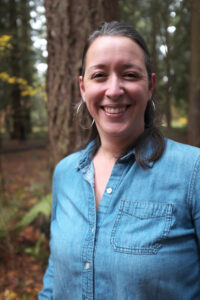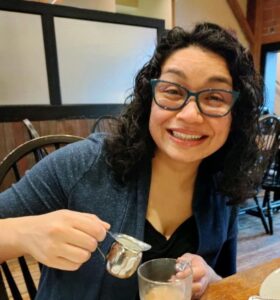To the Educator
Dear English language teacher,
This reading and writing resource is a labor of radical love. It is part of a continued goal of building English language learning resources (please see Writing for Change: An Advanced ELA Resource), to gather up what we have learned about anti-racist, culturally responsive, and anticolonial approaches.
We consider this to be part of the collective path alongside fellow colleagues in the work of rewriting the myths and false narratives of our field. We know the work requires all of us and goes well beyond one discipline. It is a call to all educators and all institutions to choose love in action; to choose change.
The chapters in this OER resource are organized in an intentional sequence, gradually transitioning from low to high intermediate proficiency readings, activities, and reflections. Reading topics center adult learners of English. Chapter activities are constructed with the College and Career Readiness Standards for Adult Education for reading and writing in mind (offering a range between levels B and C). ATOS readability levels are as follows for each reading.
- Black Lives Matter – ATOS Level 2.8
- Malala Yousafzai – ATOS Level 3.7
- Building Bridges, Not Walls – ATOS Level 4.7
- Melati and Isabel Wijsen- ATOS Level 6.1
- Billy Frank, Jr. – ATOS Level 6.3
- The Nap Ministry – ATOS Level 6.7
- Larry Itliong – ATOS Level 6.8
Please note that we intentionally capitalize the terms Black and Indigenous in order to majoritize these historically minoritized racial, ethnic and cultural identities. Also, we acknowledge that multiple definitions of “feminist” exist among scholars, and we conscientiously define this term as “a person who believes that women, men, and non-binary people should have the same rights.” Finally, we avoid phrases like “in your home country” and “in your (first) language” which may inadvertently other or exclude. In the book Race, Empire, and English Language Teaching, p. 65-69, the othering of English language students is described in further detail (Motha). We welcome more ideas about inclusive, asset-based phrasing we can incorporate into this and future texts.
Every chapter has three vocabulary exercises to prepare intermediate students to read about topics which are suitable for adult learners of English. The first exercises are formatted in such a way that instructors may prompt students to preview vocabulary with their own preferred methods. Some suggestions for how to use the space, depending on student and teacher population, are:
- Mark known words, perhaps on a scale of 0-2 (0 = unknown, 1 = perhaps known, 2 = known)
- Write or draw definitions
- Write translations
- Write synonyms or antonyms
- Identify prefixes, suffixes, and roots
- Guess parts of speech based on word forms
- Generate word families; e.g., friend (n), friendship (n), friendly (adj), befriend (v)
The topics presented are by no means exhaustive or complete. We imagine future OER contributions from fellow educators to add more resources for (re)humanizing English Language Acquisition. Together, we can continue to lift up the power of the collective within an anti-racist and decolonized framework.
This OER text includes:
- Resources and activities on identity work for the educator
- An introduction to identity work for the student
- Guided activities for developing a collectivist classroom culture
- Readings highlighting the work of community organizers, activists, and social justice movements
- Pre- and post- reading prompts for mindfulness and grounding; these are trauma-informed practices which also promote critical consciousness
- Real-life and research projects which invite learners to understand and make positive changes in their communities
- Prompts which encourage translanguaging–the use of students’ full linguistic repertoires–as a culturally affirming practice
- Samples of multiple organizational patterns for writing a paragraph
- Accessible, printable vocabulary exercises to introduce key words
- Writing prompts that ask learners to synthesize, reflect on, and connect to the readings
- Multimodal resources for further learning, including links to screen reader-friendly sites
- Accessible formatting with headings and alt text for screen readers plus descriptions of video clips which use visual imagery
As you work through this text, please do not hesitate to reach out with your questions, comments, and ideas for future collaborations. We are so honored to continue building community with you in the work and movement of change.
Sincerely,
Inés Poblet (she, her, ella), M.A. TESOL
inescristinapoblet@gmail.com

Inés Poblet (she, her, ella) is an Associate Professor in the ESOL (English for Speakers of Other Languages) program at Whatcom Community College which resides on the traditional land of the Coast Salish Peoples. Her passion for language teaching comes from her own experience as an immigrant from Buenos Aires, Argentina and from her Mexican-American heritage. Her bilingual identity has fostered her interest in code-switching, code-meshing, and the learning experiences of “systemically non-dominant” learners (Jenkins, 1995-present). Her research interests include sociolinguistics, Culturally Responsive Teaching and the decolonization of English Language Teaching.
and
Sajonna Sletten (she, her, siya), M.Ed. TESOL
sajonnamarie@gmail.com

Sajonna Sletten (she, her, siya) is the biracial daughter of her Filipino American mother and white American father. She grew up in Washington State, USA, and studied both Spanish Language and Literature as well as Teaching English to Speakers of Other Languages at Seattle University. She has taught English language to adult immigrants and refugees and international students in community colleges and language institutes throughout Western Washington. Currently she teaches in the English as a Second Language program at Bellevue College, which resides on the traditional land of the Coast Salish Peoples where dxʷləšúcid (Lushootseed) has been spoken since time immemorial. Her areas of focus are collective care, culturally sustaining andragogy, conscientization apprenticeship, and rehumanizing assessment.

